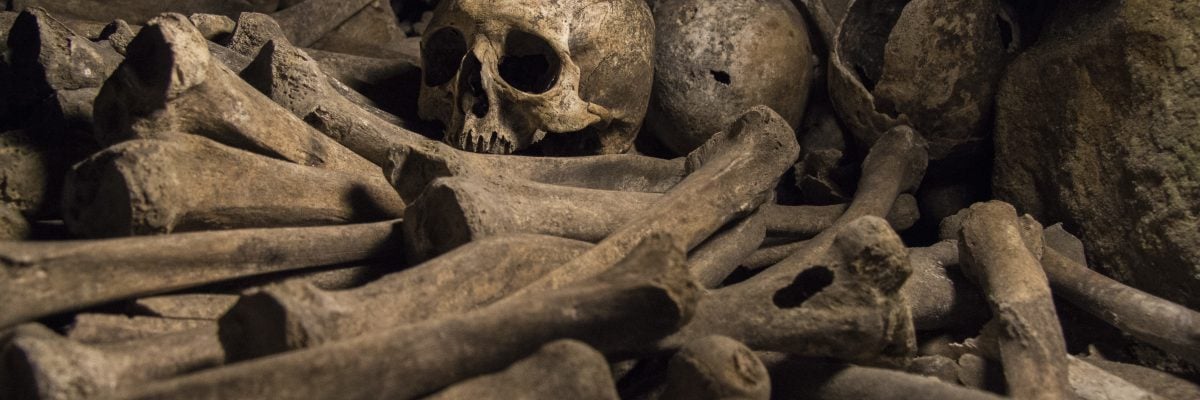
As news of the recent scandal implicating high-ranking officials in the Church, including the pope, has spread across social media, I’ve noticed a few people who have shared this quote attributed to St. John Chrysostom:
The road to hell is paved with the bones of priests and monks, and the skulls of bishops are the lampposts that light the path.
Other sources attribute a variant of this quote to St. Athanasius, who goes further than Chrysostom by saying, “The floor to hell is paved with the skulls of priests.”
Quotes like these always prompt me to ask, “Is that true?” in two senses of the question. First, “Is it true that a saint really said this?” Second, “Is what this saint allegedly said true or is it a faulty piece of thinking they never would have said?”
Concerning the former question: I can’t seem to find any original source containing this quotation. In fact, these descriptions of hell sound more like the medieval author Dante Alighieri than any of the early Church Fathers. The earliest connection between this quote and Chrysostom seems to come from the Protestant Reformer John Wesley, who said, “A lifeless, unconverting minister is the murderer-general of his parish. . . I could not have blamed St. Chrysostom, if he had only said, ‘Hell is paved with the skulls of such Christian priests!’”
But even if Chrysostom didn’t really say this, is it still a helpful piece of wisdom to share?
Again, I’ll answer in the negative. I even think that in some contexts sharing this quote can come off as smug and uncharitable. “See, I told you those priests can’t be trusted!”
It’s okay to highlight the unique dangers clergy face and to warn people that they shouldn’t infer from the existence of an infallible Church the existence of impeccable (or even relatively sinless) churchmen. The British priest and apologist Ronald Knox put it this way, “He who travels in the barque of St. Peter had better not look too closely into the engine-room.”
It’s probably not edifying to share quotes that make it seem that priests and bishops are just the kind of people who will end up being damned. Chrysostom never claimed such a thing, even though he did worry about the clergy’s souls. In his commentary on Acts of the Apostles he writes, “The soul of a bishop is for all the world like a vessel in a storm: lashed from every side, by friends, by foes, by one’s own people, by strangers . . . I do not think there are many among bishops that will be saved, but many more that perish.”
The authors of the New Testament expressed a similar concern for the clergy. James 3:1 says, “Let not many of you become teachers, my brethren, for you know that we who teach shall be judged with greater strictness.” In his letter to Timothy, St. Paul wrote, “If any one aspires to the office of bishop, he desires a noble task.” He then gave Timothy a litany of requirements for anyone who would hold this office and warned against ordaining those who were recent converts or couldn’t manage their own households. Paul feared that if one of these men were ordained, “he may be puffed up with conceit and fall into the condemnation of the devil” or “he may fall into reproach and the snare of the devil” (1 Tim. 3:6-7).
In my book Why We’re Catholic, I describe how I once spoke with a woman who struggled to reconcile her Catholic faith with the clergy abuse scandal. She asked, “If they’re really men of God in Christ’s Church, then how could they do that?”
I responded, “Let me ask you, does the devil hate Christ’s Church?”
“Absolutely!”
“Then of all the members of the Church, who is he going to attack the most?”
She thought for a moment and then said, “The priests!” This echoes St. John Vianney, the patron saint of priests, who said, “When people want to destroy religion they begin by attacking the priest; for when there is no priest, there is no sacrifice: and when there is no sacrifice, there is no religion.”
Scandals, including those that have recently hit the Church, should serve as a reminder that we should pray for one another and encourage one another in practical ways. In his letter to the Galatians, Paul wrote, “If a man is overtaken in any trespass, you who are spiritual should restore him in a spirit of gentleness. Look to yourself, lest you too be tempted. Bear one another’s burdens and so fulfill the law of Christ” (6:1-2).
Instead of sharing apocryphal quotations that can come off as an opportunistic “I told you so,” we should share prayers for priests so they can bear the unique burdens they face as the shepherds of Christ’s flock. This prayer from Pope Benedict XVI is a great example:
Lord Jesus Christ . . . Grant that all who are ordained to the ministerial priesthood may be ever more conformed to you, the divine Master. May they preach the Gospel with pure heart and clear conscience. . . . Through the prayers of the blessed Virgin Mary, your Mother and ours, draw all priests and the flocks entrusted to their care to the fullness of eternal life, where you live and reign with the Father and the Holy Spirit, one God, for ever and ever. Amen.
For more from Trent on dubious Catholic quotes, check out his book What the Saints Never Said, available from Catholic Answers Press.



